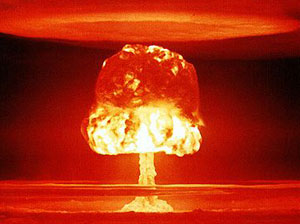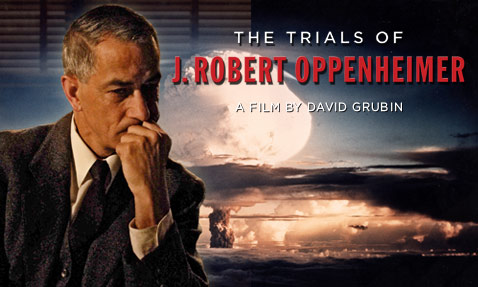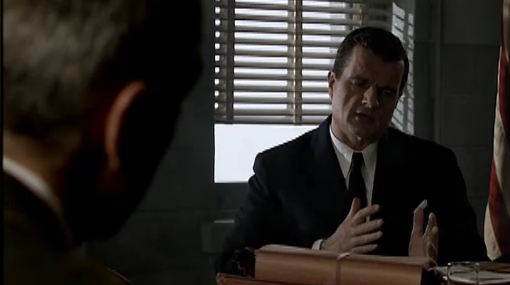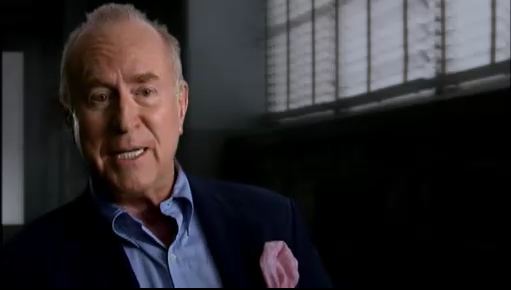Oppenheimer, nuclear bombs and McCarthyism make for a great doc
I got a chance to catch a very thought-provoking documentary last night. It was an installment of the American Experience series on PBS (a series I should probably be watching more of). Called The Trials of J. Robert Oppenheimer, it stars David Strathairn as the titular director of the Manhattan Project that developed the first atomic bomb in the mid-40s.
I was surprised to learn that even after helping the United States become a nuclear superpower, Oppenheimer was put on trial in 1954 for pre-war Communist associations. The bizarre political climate of McCarthyism was in full swing, and trials like that of Oppenheimer were common. Moreover, the film felt oddly topical, and noticed how well it comments on the current political climate in the United States.
I actually found this documentary online on the PBS website, where you can watch it whenever you want, for free. I was immediately attracted to it because I’m a nut for 1950s American military and political history – I love reading up on the nuclear weapons program and the frightening consequences of McCarthyism.
The film is constructed around Strathairn’s portrayal of Oppenheimer in dramatized recreations of the trials, interviews with physicists and writers, and pieces of archival footage and photographs. The film also includes an emotional element, telling the personal story around Oppenheimer’s struggles with depression and the ethics of unleashing such a powerful weapon on the world.
To give a bit of context, Oppenheimer was chosen to lead the Manhattan Project at the Los Alamos Laboratory in New Mexico, where the first nuclear test, codenamed Trinity, was designed and built. Oppenheimer was more of a theoretical physicist, with an interest in witnessing the very limits of what humans could do.
Oppenheimer was a super-intelligent, wiry man with a complicated and precise way of speaking, and possessed an interest in poetry, especially Hindu scripture. He famously commented that upon seeing the Trinity detonation, he was reminded of the line from the Bhagavad-Gita: “Now I am become Death, the destroyer of worlds.”
David Strathairn’s performance as J. Robert Oppenheimer impressed me right out of the gate. I first saw him as CIA Deputy Director Noah Vosen in The Bourne Ultimatum, and then as famed CBS broadcaster Edward R. Murrow in George Clooney’s Good Night, and Good Luck. In that film, Strathairn played a dedicated journalist who was willing to challenge Sen. McCarthy at the height of the investigations McCarthy was conducting into supposed Soviet subversion.
In an intriguing coincidence, in this PBS film Strathairn takes on another persona from the period who came up against the government. Strathairn hits all the key scenes in conveying a man who struggled both with the implications of his career and his own identity.
I liked Strathairn’s portrayal so much that I was almost disappointed the film wasn’t more of a docudrama – with everything told through recreations. But the director, David Grubin (responsible for a number of films on history, art, science and politics), makes effective use of the interviews and archival material to tell the story. Even when photos of the real Oppenheimer are intercut with Strathairn, the resemblance seemed plausible.
What lent The Trials of J.Robert Oppenheimer some credibility was how they conducted interviews with real physicists - former students of Oppenheimer at the Institute of Advanced Study at Princeton, who knew him and could give us direct accounts of what he was like in person. The scientists also offered their own recollections of the nuclear tests and their ideas about what was happening politically at the time.
I was struck by how duplicitous the American government seemed in this film. They employ Oppenheimer to lead the project to create an ultimate weapon, and when the ensuing weapons race with the Soviets starts, suddenly he is the prime suspect of leaking secrets. The government’s case was led by statesman Lewis Strauss, who apparently hated Oppenheimer for embarrassing him at a Congressional hearing on the proliferation of nuclear isotopes.
Strauss appears to have masterminded the hearings in 1954 more out of a desire for personal revenge than to secure the nation’s security. I half expected the narrator to say this little feud helped inspire the petty statesmen in Kubrick's Dr. Strangelove.
Of course, this is just one production team's approach to the story. When it comes to this period of American history, I always feel like there's more layers to the real events than can be captured in a single documentary. You owe it to yourself to do some of your own research to get a full understanding of the people and events.
Why? Even though the film was released in 2009 and set in 1954, it actually seems to be relevant to today’s political climate in the United States. While the Republican Party and right-wing groups like the Tea Party are nowhere near as vicious or oppressive as certain elements of the government in Senator Joseph McCarthy’s era, they still loudly oppose any social programs like government-funded healthcare (a great thing in Canada, by the way) as “socialist” or “communist”.
They make progressive policies terribly difficult to implement by preying on an unconscious (some would say conscious) fear of communism that has existed in America since Red Scare in the 1940s and 50s. I’m glad that directors like Grubin are still making films like this one to inspire viewers to read up on what really happened when McCarthyism took hold in America.
If the film is at all accurate, more viewers should be reminded of the pervasive surveillance, trumped-up evidence and career-ruining trials in 1950s America. It could very well be a cautionary tale for modern society.
-
I’d recommend you check out the documentary here (remember, it’s free!) and tell me what you think of it in the comments! Also, am I totally off-base in connecting this film to contemporary politics? In case you’re interested, there are loads of other documentaries in this series available on the website, including one focused specifically on the development of the hydrogen bomb. Check back on Sunday for my review of Saturday's Doctor Who episode, "The Almost People"!
-








